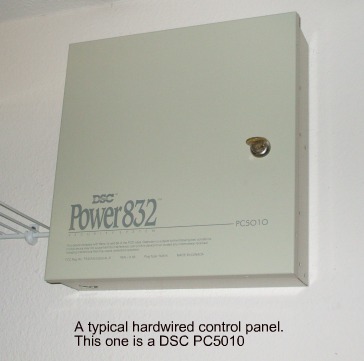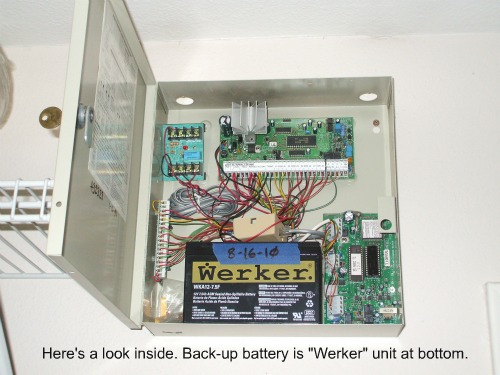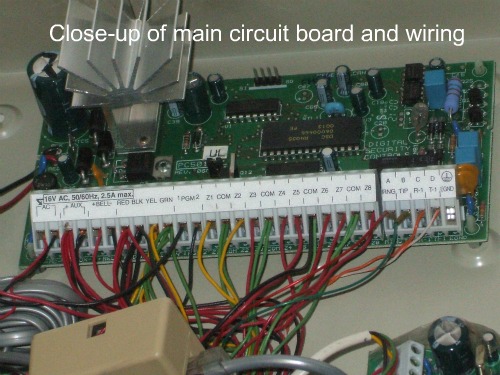- Home
- Compare Systems
- Cheap Systems
- Free Quotes
- DIY Systems
- Hardwired Systems
- Wireless Systems
- Smoke Detectors
- Medical Alarms
- Alarm Monitoring
- Cameras & Video
- Ademco
- ADT Security
- Brinks Security
- Broadview
- DSC Security
- FBI Alarms
- GE Security
- Honeywell
- Link Interactive
- Monitronics
- Moose
- Napco
- Protection 1
- Radionics
- Simplisafe
- Alarm Manuals
- Alarm System Parts
- Alarm Tools
- Troubleshooting
- FAQ
- Glossary
- Sitemap
- About Me
- Contact Me
The Best Hardwired Home Security System Advantages

I have always recommended a hardwired home security system over a
wireless system, provided that wiring is an option.
Don’t get me wrong; if wireless is the only choice, go for it. I’ve installed plenty of wireless systems, and the modern equipment available today works great in most cases.
But, if a home has been
pre-wired during construction, or if attic space is available, I still advise
choosing a hard wired security system.
Here are my biggest reasons:
A Hardwired Home Security System is “Generic”
Hardwired systems use door and window switches and sensing devices designed to connect with either 2- or 4-conductor wiring. These devices are generic, and can connect to nearly any brand of alarm system. Only the keypads are proprietary, or brand-specific.
Wireless alarm systems must use transmitters for sensors. These
communicate by radio, and only “speak the same language” as the system
they were designed for. If you want (or need) to change the alarm
system, all the transmitters must also be changed.
Most people will install an alarm system, then forget about it. One more item crossed off the to-do list.
When will they think about replacing it? When something breaks.
The most common thing to fail on most alarm systems is a door or window sensor. For a wired home security system, this means replacing an inexpensive switch and magnet. For a wireless system, it may mean a new transmitter. If the transmitter is no longer in production, you’re looking at replacing the entire system.
Whether you buy a wireless or a hardwired home security system, try to choose a brand you’ve heard of.
Some very reputable names are Ademco, DSC, Honeywell, Moose, Napco, GE, Caddx, DMP, and Radionics.
I recommend these brands not just because they make good stuff. Rather, if a panel or keypad fails someday, these companies will most likely still be in business, and able to provide a replacement for the failed part.
Needless to say, this is MUCH cheaper than changing
out the whole system!

Hardwired Reliability
Anytime signals must travel across open space, they can be come
compromised. As much as wireless technology has improved, it doesn't
change the fact that it’s wireless. Radio, basically… and subject to all
the possible problems with radio reception. Think: Dropped calls on your cellphone.
Radio signals can be blocked, absorbed, or reflected by objects in your home. Large mirrors, metal file cabinets, and some wall
coverings can create dead spots. Even some building materials can cause trouble, like steel re-bar, stucco screening, and adobe.
While dead spots can mean little or no signal, the flip side can
be just as bad. All kinds of devices use radio, and they can interfere
with each other.
The RF (radio frequency) spectrum has been over-crowded for many
years. This spectrum is sliced into bands allocated to all kinds of
equipment, and the FCC regulates it fairly tightly. Unfortunately,
interference can still occur. Consider all the wireless equipment we use
every day:
- Remote controls for garage doors, irrigation systems, gates
- RF remotes for whole-house audio
- Cordless phones
- Baby monitors
- CB and ham radios
- FRS walky-talkies
- Remote controls for wireless toys
- Cell phones
- Wireless networks
And these are just the intentional sources of radio signals. There is also plenty of unintentional RF energy being generated as a by-product of normal operation:
- Flat-screen TV’s
- Well, OK, all TV’s!
- Microwave ovens
- Computers
- Paper shredders
- Cable and satellite TV boxes
- Fluorescent lighting
- Dimmers and low-voltage home lighting
- Home automation systems
…And the list goes on. It’s a wonder that any of this stuff works at all! If this energy were audible to humans, we would probably all be deaf!
Even so, these things aren’t usually an issue for an alarm
system. Unless the house is very large, or coverage must extend to
detached structures like garages and guest houses, the “average”
wireless alarm system will be installed with little or no trouble.
However, changes to the home after installation can cause
problems. Who knows what new sources of RF interference may wind up in
your home in the future? A child’s wireless toy? A new satellite
converter box?
To put it another way, which would you prefer: a hardwired connection to your desktop computer, or a wireless one? I’ve used both, and the hardwired connection has never gone down…. The same thinking can be applied to your security system.

Cost of Alarm Equipment
Hardwired home security system equipment is cheaper than
wireless alarm devices. Hardwired sensors don’t have to transmit RF
signals, and they don’t need an on-board battery. This leads to a lower
cost for the equipment, in a given size house.
The other half of the equation is labor. If wires are difficult to run, the money saved on the equipment is spent on getting the installation completed.
Getting estimates is the best way to know which side of the fence
your home is on. Most alarm companies are more than happy to come to
your house, count up doors and windows, suggest locations for motion
sensors, etc., and propose a system for you. The representative can tell
you if a hardwired home security system is the best way to go, and give
you a good idea on the price.
If you don't have time to have a representative visit your house, you can also get free home security systems quotes from companies in your area. This will give you a good idea of how your local pricing differs for each kind of system.
If a wired system is doable, and is priced about the same as the
wireless equivalent, lean toward hardwired. Over time, the cost of one
or two wireless battery changes alone will offset any minor difference
in the initial cost. Do be sure that each type of system offers the same level of protection; otherwise price comparisons are meaningless.
Related Articles:
For details on door and window switches, see this page on Hardwire Contacts.
For garage protection, see Connecting a Garage Door Contact to a Home Security System and The Best Overhead Door Contact Mounting Locations.
If you haven't done so already, get a few Free Home Security Systems Quotes from companies in your area.
This will give you a good idea of what it would cost to have a system installed, as well as how much you could save by doing it yourself.
Return to Home-Security-Systems-Answers from Hardwired Home Security System Advantages
Return to Hardwired Security Systems from Hardwired Home Security System Advantages
Note: Feel free to print any of the articles on this site for personal, non-commercial use. Just look for this button:
If you found this website especially helpful, you might want to consider making a small donation. Since 2011, AzAlarmGuy has been providing free help and advice on home security systems to all of those in need.
Your gift, in any amount, will help me keep this website a free resource for anyone needing help with alarm system issues or questions.
Disclosure
I receive affiliate commissions from some of the companies and products I discuss. These commissions don't change the price that you pay.
Rest assured that this compensation does not influence my recommendations. I only endorse products and services that I truly believe to be an honest value for you, as a visitor to my site.
For more details, see my full disclaimer.





